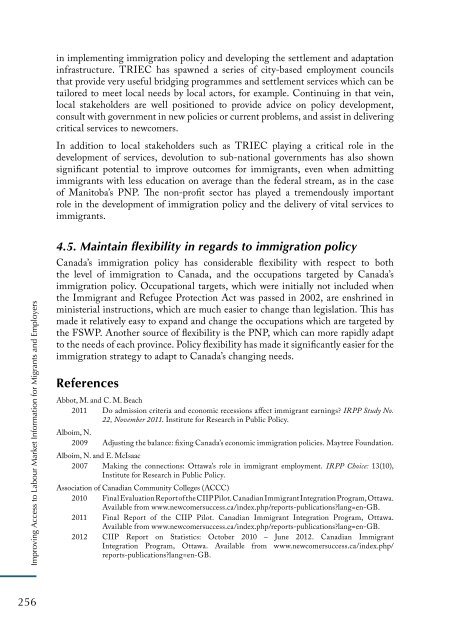International Organization for Migration (IOM)
International Organization for Migration (IOM)
International Organization for Migration (IOM)
You also want an ePaper? Increase the reach of your titles
YUMPU automatically turns print PDFs into web optimized ePapers that Google loves.
Improving Access to Labour market In<strong>for</strong>mation <strong>for</strong> migrants and employers<br />
256<br />
in implementing immigration policy and developing the settlement and adaptation<br />
infrastructure. TRIEC has spawned a series of city-based employment councils<br />
that provide very useful bridging programmes and settlement services which can be<br />
tailored to meet local needs by local actors, <strong>for</strong> example. Continuing in that vein,<br />
local stakeholders are well positioned to provide advice on policy development,<br />
consult with government in new policies or current problems, and assist in delivering<br />
critical services to newcomers.<br />
In addition to local stakeholders such as TRIEC playing a critical role in the<br />
development of services, devolution to sub-national governments has also shown<br />
significant potential to improve outcomes <strong>for</strong> immigrants, even when admitting<br />
immigrants with less education on average than the federal stream, as in the case<br />
of Manitoba’s PNP. The non-profit sector has played a tremendously important<br />
role in the development of immigration policy and the delivery of vital services to<br />
immigrants.<br />
4.5. Maintain flexibility in regards to immigration policy<br />
Canada’s immigration policy has considerable flexibility with respect to both<br />
the level of immigration to Canada, and the occupations targeted by Canada’s<br />
immigration policy. Occupational targets, which were initially not included when<br />
the Immigrant and Refugee Protection Act was passed in 2002, are enshrined in<br />
ministerial instructions, which are much easier to change than legislation. This has<br />
made it relatively easy to expand and change the occupations which are targeted by<br />
the FSWP. Another source of flexibility is the PNP, which can more rapidly adapt<br />
to the needs of each province. Policy flexibility has made it significantly easier <strong>for</strong> the<br />
immigration strategy to adapt to Canada’s changing needs.<br />
References<br />
Abbot, M. and C. M. Beach<br />
2011 Do admission criteria and economic recessions affect immigrant earnings? IRPP Study No.<br />
22, November 2011. Institute <strong>for</strong> Research in Public Policy.<br />
Alboim, N.<br />
2009 Adjusting the balance: fixing Canada’s economic immigration policies. Maytree Foundation.<br />
Alboim, N. and E. McIsaac<br />
2007 Making the connections: Ottawa’s role in immigrant employment. IRPP Choice: 13(10),<br />
Institute <strong>for</strong> Research in Public Policy.<br />
Association of Canadian Community Colleges (ACCC)<br />
2010 Final Evaluation Report of the CIIP Pilot. Canadian Immigrant Integration Program, Ottawa.<br />
Available from www.newcomersuccess.ca/index.php/reports-publications?lang=en-GB.<br />
2011 Final Report of the CIIP Pilot. Canadian Immigrant Integration Program, Ottawa.<br />
Available from www.newcomersuccess.ca/index.php/reports-publications?lang=en-GB.<br />
2012 CIIP Report on Statistics: October 2010 – June 2012. Canadian Immigrant<br />
Integration Program, Ottawa. Available from www.newcomersuccess.ca/index.php/<br />
reports-publications?lang=en-GB.


